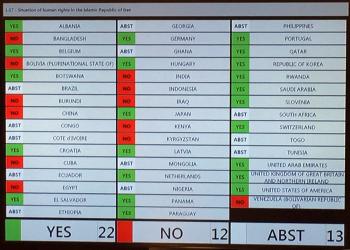Mandate renewed for UN Iran human rights monitor
Following strong expressions of concern about human rights violations in Iran from the UN Secretary General and the Special Rapporteur for human rights in Iran, the Human Rights Council today voted to extend the mandate of the Special Rapporteur for another year, ensuring continued monitoring of the situation.
“The human rights situation in Iran has generally not improved,” said Diane Ala’i, a representative of the Baha'i International Community to the United Nations in Geneva, “while in fact for Baha’is the situation has in many ways deteriorated over the last year.
“Baha’is continue to face severe economic discrimination, are barred from higher education, and remain subject to arbitrary arrest and imprisonment, all for their religious beliefs. And so we very much welcome the renewal of the Special Rapporteur’s mandate,” she said.
The vote renewing the mandate of the Special Rapporteur, Asma Jahangir, passed by 22 to 12 with 13 abstentions.
In their reports to the Council earlier this month, both Ms. Jahanagir and Secretary-General António Guterres expressed strong concern about continuing violations in Iran – including the situation of Iranian Baha’is.
“The Special Rapporteur is particularly concerned ‘at the continuing systematic discrimination, harassment, and targeting of adherents to the Baha’i faith,’” wrote Ms. Jahangir. “She notes that discrimination against the Baha’i community in Iran is legally sanctioned by a lack of constitutional recognition and the absence of other legal protections for adherents of this faith.”
Ms. Jahangir added that there are currently 90 Baha’is in prison, “all reportedly detained on false charges related solely to their religious beliefs and practices.”
The list, she said, includes seven Baha’i leaders who received ten-year sentences and currently remain in prison for allegedly “disturbing national security,” “spreading propaganda against the regime,” and “engaging in espionage.”
In his report, Mr. Guterres indicated he agrees with his predecessor, Ban Ki-moon, that Baha’is can be considered “the most severely persecuted religious minority in the Islamic Republic of Iran.”
“The Secretary-General is concerned about the serious violations of the right to education, work and an adequate standard of living,” wrote Mr. Guterres, adding that between June and November 2016, “at least 150 businesses owned by Baha’is across the country were shuttered by the authorities.”
Ms. Jahangir's report can be read here.
Mr. Guterres' report can be read here.
